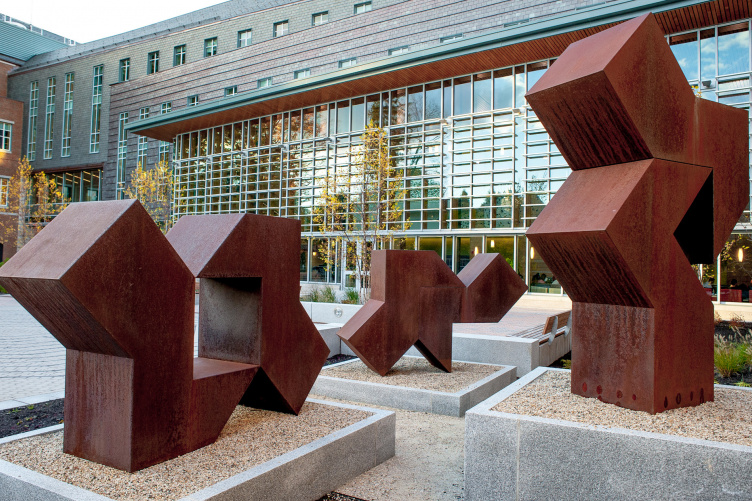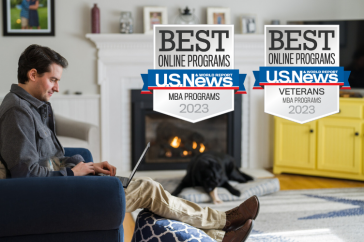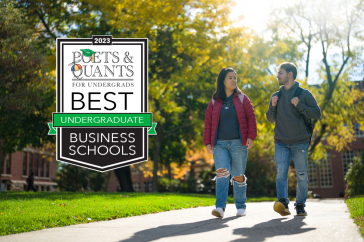
Paul College is continuing the tradition of faculty research and teaching excellence.
The Paul Experience
Since its inception, Paul College has distinguished itself with a faculty that excels in teaching and research and a student experience that highlights engagement with the business community.
The results so far are very promising.
Undergraduate enrollment has surged by 40 percent over the past several years, and Paul College has increasingly become the school of choice for students in New Hampshire and the Northeast.
Paul College's success has been recognized by others: Last year the college’s undergraduate business program was ranked 81st in the nation by Bloomberg Businessweek and 38th among business schools at public universities. Most recently, U.S. News and World report ranked Paul's online and part-time MBA programs among the top 100 nationally.
Learn More
A little more than three years ago, the Peter T. Paul College of Business and Economics opened the doors to its state-of-the-art facility on the University of New Hampshire campus. Building on the legacy of its predecessor, the Whittemore School of Business and Economics, Paul College had ambitious goals to become one of the nation’s top business schools — distinguished by a faculty that excels in both teaching and research.
A key part of Paul College's success has been its ability to build on its strong faculty by attracting and hiring 23 new tenure-track faculty members over the past three years.
“The college looked for young faculty members who are doing interesting research that complements the research strengths of our current faculty,” says Peter Lane, associate dean of faculty and graduate programs. “It was important that these new faculty shared the commitment to excellence in both research and teaching that is a key part of our culture. We are a business school at a land-grant university. Exploring and sharing the practical application of rigorous knowledge is central to who we are.”
Meet some of Paul College’s new assistant professors

Danielle Brick, Assistant Professor of Marketing
Ph.D., Duke University
Field specializations: brand and interpersonal relationships, shared consumer decisions and experiences, consumer welfare
Relationship and Brand
When you’re frustrated with your partner, do you choose to purchase something from a brand opposite of what your partner prefers? It’s very likely, according to Danielle Brick, assistant professor of marketing, based on her research.
"Individuals may use brand choice to respond to that frustration,” Brick says. “It seems to arise from two conflicting desires of wanting to express frustration but not wanting to harm the relationship and is more likely to be used by people who are lower in relationship power.”
Using brands to navigate interpersonal relationships can be found in other areas of her work. In a recent paper, Brick found that feeling or perceiving greater resources can lead people to prefer brands, and brand relationships, more than other people.
Brick studies how close relationships and consumer behavior intertwine. She defines close relationships “as ones that involve repeated diverse interactions resulting in a degree of interdependence or ones in which there exists a connection or bond between the members.”
This definition allows for other types of relationships besides romantic ones, such as brand relationships and the patient-physician relationship, to be included in her framework.
“Close relationships are one of the strongest predictors of well-being,” Brick says. “A better understanding of how they influence our behavior, including our consumer decisions, attitudes, and purchases, can help us to enhance consumer welfare.”

Jianhong Chen, Assistant Professor of Strategic Management
Ph.D., Drexel University
Field specializations: CEO and top management team temporal orientation and deep-level composition, competitive dynamics and corporate entrepreneurship
Top Management Teams
Jianhong Chen has seen firsthand how the personality of a company’s leader can be important for its growth.
“Before I came to the United States, I had been working at a small start-up firm in China for three years. It grew very fast, and one of the main reasons, I think, is the founder’s own personality,” Chen, assistant professor of strategic management, says. “Since then, I have been very interested in the relationship between a CEO’s psychological attributes and a firm’s strategy.”
Chen examines how the psychological attributes of top executives can influence corporate entrepreneurship and the competitive strategies of a firm.
She has discovered that time management, in particular, is a key part of this connection. A CEO’s preferences in the areas of time urgency (the feeling of being chronically hurried) and pacing style (the distribution of effort over time while working toward a deadline) significantly influenced a firm’s strategy and performance.
Chen and her collaborators’ research has been recognized with two awards from the Business Policy and Strategy Division of the Academy of Management: The Sumantra Ghoshal Research and Practice Award in 2016 and the Distinguished Paper Award in 2013.
Andrew Earle, Assistant Professor of Strategic Management and Entrepreneurship

Ph.D., University of Oregon
Field specializations: innovation oriented business strategy, technology entrepreneurship, organizational ambidexterity
Building Innovation
How can we build more innovative organizations and communities? This is the key motivating question for Andrew Earle, assistant professor of strategic management and entrepreneurship, as he studies how scientific discoveries become successful businesses.
“The most interesting, overarching observation from my research program is how little we actually know about innovation. From how we measure it to how we promote it to why established firms are constantly being disrupted, there is a lot of work to be done to provide better answers to these questions,” Earle says.
Innovation is integral to Earle’s research because he studies scientific discoveries, start-up firms and technology — areas where innovation is essential. His work in network design for innovation brings knowledge from industries like chemical manufacturing and transportation and explores how network-derived innovations can generate significant economic benefits for companies and social benefits for communities.

Zhaozhao He, Assistant Professor of Finance
Ph.D., University of Kansas
Field specializations: corporate behavior, effects of talent competition on firm cash holdings
Corporate Cash Management
“U.S. corporations are hoarding more than $2 trillion of cash, a fact that has attracted unprecedented attention from the business press, financial economists and government,” says Zhaozhao He, assistant professor of finance.
Why are companies holding so much cash? In today’s economy, competition for talent and the need to innovate are high, and cash reserves — or in this case, cash “hoards” — help a company stay competitive and financially flexible.
While studying this trend, He has discovered that this uptick in cash-to-assets ratio only exists in firms that invest in research and development (R&D), dating back to 1980.
“We document that changing R&D investment itself has contributed to the buildup of cash holdings by more than 20 percent. This increased propensity of innovative firms to save is related to more intensified domestic and global competition,” she says. “My work suggests that increased intangible capital, like innovation investment and skilled labor, matters for corporate financial policies.”

Ali Hojjat, Assistant Professor of Decision Sciences
Ph.D., University of California, Irvine
Field specializations: operations research, mathematical modeling, large-scale optimization, revenue management
Large-Scale Optimization
Online advertising is a $60 billion industry. Large publishers like Google, Facebook and Yahoo typically have hundreds of thousands of advertising contracts that demand a given ad be shown a certain number of times to a target audience over a given time period. How can this be managed efficiently given that publishers have only a fraction of a second to decide which ads load on a page for a specific user?
That’s where Ali Hojjat, assistant professor of decision sciences, and his research come in.
“I design algorithms for efficiently solving large-scale optimization problems,” he says.
Hojjat focuses this work on online advertising, most specifically, helping to uncover the best ways for publishers to schedule online advertising to maximize revenue.
“Even a few percent improvement in showing the right ad to the right person at the right time can increase a publisher’s revenue by tens of millions of dollars,” says Hojjat.
He hopes to change the current model of online advertising to better distinguish impressions and users.
“My research is the first to propose efficient algorithms for publishers to optimally plan and serve advertising contracts that explicitly specify reach, the number of users to see the ad and, frequency, the number of times each user should see the ad to be counted as reached.” Hojjat says. “This new form of ad campaign is harder to serve, but we expect it to dramatically improve advertiser’s ROI and flexibility and enhance user experience.”

Michael Kukenberger, Assistant Professor of Organizational Behavior
Ph.D., University of Connecticut
Field specializations: social, psychological and leadership behaviors of teams
Shared Leadership
Do too many cooks in the kitchen really spoil the broth? That old adage is actually not often true, according to Michael Kukenberger.
Kukenberger, assistant professor of organizational behavior, examines the social, psychological and leadership behaviors of teams.
“My work examines leadership from an informal, emergent and shared perspective. Leadership is a process and not a person, and my work has provided evidence that when teams share leadership, better things happen downstream,” he says.
There are many places where teamwork is essential, Kukenberger says, listing places like hospitals, sports arenas and even our skies. Teamwork can even play a role in daily social interactions, so it’s important to get it right.
“When teams are working, they allow us to work together to tackle difficult, complex and dynamic tasks,” he says.
Kukenberger’s research is being put into practice, as he is often consulted by Fortune 500 companies, the U.S. Army, hospitals and government agencies.
“I am particularly proud of the work I have done with such groups as the U.S. Army Transition Teams and the Centers for Disease Control and Prevention response teams, as the level of effectiveness for those teams can have life or death implications,” he says.

Deniz Ozabaci, Assistant Professor of Economics
Ph.D., State University of New York at Binghamton
Field specializations: econometrics, microeconometrics, economics of education
Alternative Solutions
Deniz Ozabaci has always loved researching for answers and solutions to a problem.
She recalls a past job interview where she was given tasks to complete: “I kept thinking about different ways to solve the problem and had trouble focusing on getting the job done. This later made me realize that I would be happier searching for different, alternative, maybe better solutions,” she says.
This, along with a number of research projects, led her to academia. She recently joined Paul College’s faculty as an assistant professor of economics.
Her focus in econometrics is a “different solution” of sorts, she says. “My line of work focuses on relaxing types of restrictions commonly imposed in the literature.”
Ozabaci develops quantitative data analysis models with the fewest functional and distributional restrictions possible, which contribute to the literature by providing researchers models that may help them extract further information from their data with fewer assumptions and may lead them to more accurate results, too.
She also applies these techniques and models to analyze the economics of educational decisions among individuals. One research project shows that childcare either affects children very little or negatively — unless they are the children of young single mothers with lower education and work experience.
Another, exploring the economic effects of college degree completion, found that single females of Hispanic origin benefit more from a college degree compared with other ethnicity and race groups.

Daniel Remar, Assistant Professor of Hospitality Management
Ph.D., University of South Carolina
Field specializations: food and beverage operations management, sustainable food systems, consumer behavior and intention
Sustainable Food Systems
After spending a decade cooking and working in kitchens, Daniel Remar saw both the good and the bad sides of restaurants and food service businesses, and he wanted to improve both.
The food service industry affects our lives in many different ways, Remar says, listing health, employment (10 percent of the U.S. workforce works in restaurants), the economy (nearly $800 billion in industry sales) and the environment as areas of impact.
“Because the industry has such a significant impact on people’s lives, the need for sustainability became apparent,” he says. “There were problems I wanted to try and help solve, and I saw lots of areas that I thought were in need of improvement.”
As an assistant professor of hospitality management, Remar studies food service and consumer behavior with a focus on sustainability. His research interests span social, economic and environmental responsibility as it relates to food service and consumer behavior, including health consciousness, waste and the consumption of natural resources.
One of Remar’s current projects involves sustainable seafood and the restaurant industry. His goal is to have his research inform best practices in industry as well as hospitality management theory.
-
Written By:
Whittney Gould | Peter T. Paul College of Business and Economics | whittney.gould@unh.edu | 603-862-1704



















































